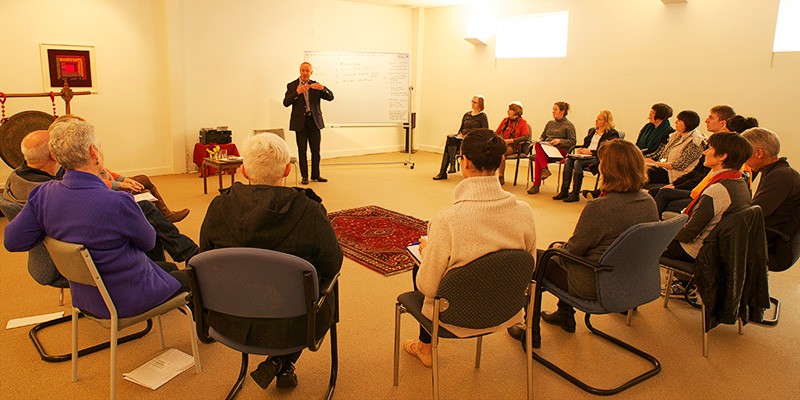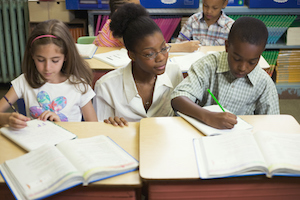Study: Mindfulness training for teachers can result in a better learning environment for students
 —
—
No one would argue with the fact that teaching is stressful. Not only is the work highly challenging, teachers are also frequently underpaid, undervalued, and subject to harsh scrutiny. No wonder teacher burnout is on the rise and that many feel like leaving their profession.
But teacher stress is not only a problem for teachers; it can also be a problem for students. Stressed teachers impact students’ stress levels through a contagion effect, and since student stress impacts learning, this can hurt the quality of education in the classroom. Students learn better in a climate that is more emotionally positive and less stressful, and past studies have shown a clear link between positive emotional classroom climates and academic achievement.
The Study

Now, a new study (details below) from the University of Virginia provides strong evidence that mindfulness training for teachers can help them cope better with stress on the job while also making the classroom environment more productive for learning.
Two hundred and twenty-four teachers from 36 urban elementary schools in New York City with primarily low-income/high-risk students were randomly assigned to receive instruction via a program called Cultivating Awareness and Resilience in Education (CARE), a 30-hour mindfulness-based training for teachers spread out over a four-month period. The program involved training in mindful awareness, stress reduction, and emotion skills aimed primarily at increasing teacher wellness rather than improving teaching, per se.
Teachers reported on their levels of well-being, mindfulness, confidence in their teaching ability, physical health, and psychological health before and after the program. In addition, their teaching quality was independently measured before and afterward by raters who didn’t know which group of teachers they were observing.
The Findings
Analyses showed that receiving the CARE training improved the teachers’ mindfulness and their ability to manage anger and other difficult emotions, and lowered their psychological distress and sense of time urgency—particularly important benefits in such stressful conditions.
“If you’re a teacher, you can’t walk out while you’re teaching; and if you’re a student, you can’t walk out, either—it puts a level of pressure on teachers that I don’t think many people recognize,” says Patricia Jennings, the lead author of the study.
Perhaps more surprisingly, the study also found improvements in the emotional climate of the classroom and increased class organization for those teachers who’d been through the training. Those trained via CARE behaved differently in the classroom—smiling more, asking more questions, remaining curious about student misbehavior rather than moving toward punishment, and taking deep breaths and slowing down encounters with students when annoyed rather than yelling.
“After training in CARE, you might see teachers take things less personally,” says Jennings.
But what’s most exciting to her is that these changes were accomplished by training teachers, not the students themselves.
“The intervention totally focused on the teacher—we didn’t do anything for the kids at all,” says Jennings. “While we may want our kids to be mindful, taking time out of the day to do mindfulness with kids without integrating it into the general curriculum is really hard.”
In conclusion
Jennings’s study is the largest study to date looking at how mindfulness training impacts teacher well-being and the emotional climate of their classrooms. It adds to a growing body of research suggesting that mindfulness affects not only teacher stress, but also interpersonal interactions that can have an important impact on learning.
“I had a very strong suspicion that emotional reactivity was interfering with a teacher’s ability to be their best, and that the solution wasn’t just a matter of teaching more skills, it was really a matter of teaching them to self-regulate so they could be their best,” says Jennings.
Her future research plans include increasing the capacity for this kind of training in schools, studying the impacts of combining CARE with student-focused mindfulness or social-emotional learning training, and looking at whether or not mindfulness training impacts implicit bias or other barriers to effective teaching. She hopes that studies like hers will focus more attention on the issue of teacher well-being.
“I think it’s really important for people to recognize that teachers need all of the support they can get and that they need our help and not criticism,” says Jennings. “If we don’t turn the corner on how we’re helping our teachers, we’re not going to have enough teachers to do the job.”
The study: Impacts of the CARE for Teachers Program on Teachers’ Social and Emotional Competence and Classroom Interactions (Journal of Educational Psychology)
- Abstract: Understanding teachers’ stress is of critical importance to address the challenges in today’s educational climate. Growing numbers of teachers are reporting high levels of occupational stress, and high levels of teacher turnover are having a negative impact on education quality. Cultivating Awareness and Resilience in Education (CARE for Teachers) is a mindfulness-based professional development program designed to promote teachers’ social and emotional competence and improve the quality of classroom interactions. The efficacy of the program was assessed using a cluster randomized trial design involving 36 urban elementary schools and 224 teachers. The CARE for Teachers program involved 30 hr of in-person training in addition to intersession phone coaching. At both pre- and postintervention, teachers completed self-report measures and assessments of their participating students. Teachers’ classrooms were observed and coded using the Classroom Assessment Scoring System (CLASS). Analyses showed that CARE for Teachers had statistically significant direct positive effects on adaptive emotion regulation, mindfulness, psychological distress, and time urgency. CARE for Teachers also had a statistically significant positive effect on the emotional support domain of the CLASS. The present findings indicate that CARE for Teachers is an effective professional development both for promoting teachers’ social and emotional competence and increasing the quality of their classroom interactions.
 Jill Suttie, Psy.D., is a book review editor and a frequent contributor to Greater Good. Based at UC-Berkeley, Greater Good highlights ground breaking scientific research into the roots of compassion and altruism. Copyright Greater Good.
Jill Suttie, Psy.D., is a book review editor and a frequent contributor to Greater Good. Based at UC-Berkeley, Greater Good highlights ground breaking scientific research into the roots of compassion and altruism. Copyright Greater Good.
To learn more:


